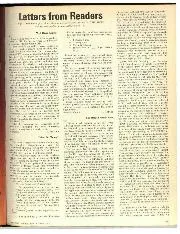
The British Grand Prix
Sir, This is a sad moment in my life. After following motor sport activities since 1926, and deriving such great pleasure from some, I have now been forced to make…
Sir,
When I read of the dreadful losses sustained by the motor departments of various insurance companies, my heart bled for them; it was enough to make one burst into tears—the poor things. Then I began thinking: Why do insurance companies chase motor insurance so hard? Why are so many brokers fiercely competing with each other, cutting rates in their efforts for more business (or should I say “more losses”)? If companies lose so much, why take Motor insurance at all? Perhaps the truth is that there is sometimes a tiny margin between premiums and claims that enables them to build huge buildings and finance loans. Whatever it is, the present tale doesn’t impress me a bit.
In New Zealand, where the same cry of heartrending losses is heard, the premiums are less than one third that of England, yet there is one company which does motor-car insurance exclusively who recently returned 20 per cent, of the premiums to their policy holders (they are a mutual company). They have for years been vigorously engaged in acquiring and erecting large buildings to house their offices and take care of expanding business, yet have not raised one penny of additional capital. They do not finance mortgages, concentrating on insurance, not moneylending. The management is good, but surely it cannot be three times better than in England.
Personally, I can think of only three reasons why anyone should indulge in motor insurance: (1) You intend to smash the car completely and immediately, yourself. (2) The finance company, who are the real owners, demand that you insure to protect their security. (3) You’re crackers. I would not dream of insuring my car, for I have no intention of hitting things and smashing it, and make sure that doesn’t happen. Should anyone hit me, his third party will take care of that. Perhaps you think this is stupid reasoning, but here is how it has worked out: From 1924 to 1947 I carried the risk myself (no insurance). No accidents and no losses. If you average the premiums that would have been paid at £18 per annum, I saved £414. Quite a lot of money. From 1947 to 1957 I did insure my car, because cars were hard to get and the dealer who obliged me was an agent, it cost me nearly £180. A dead loss, for again no claims and no accidents.
Now good reader, apply my system to yourself; add up what insurance has cost you for the past years and set against the total all the claims paid out. You will be surprised. A short while ago, a few people were sitting around the fire when I mentioned my savings. One chap commented: ” It’s all right for you, but I had a crash last year.” How much? It cost £60 to repair, but he has been paying £35 p.a. for seven years, so there is still £180, plus interest, left of the money he paid the insurance company. None of the remaining four had had a claim at all. Net profit to the insurance company. I am some kind of a business man. I require a profit from every penny I invest. I do not invest in motor insurance because I cannot see any returns.
None of the foregoing refers to the compulsory third-party insurance, which I think is a good thing in principle, but not at the rates charged in England.
I am, Yours, etc.,
A. R. E. Messenger – Shepperton-on-Thames. [This correspondence is now closed.—Ed.]